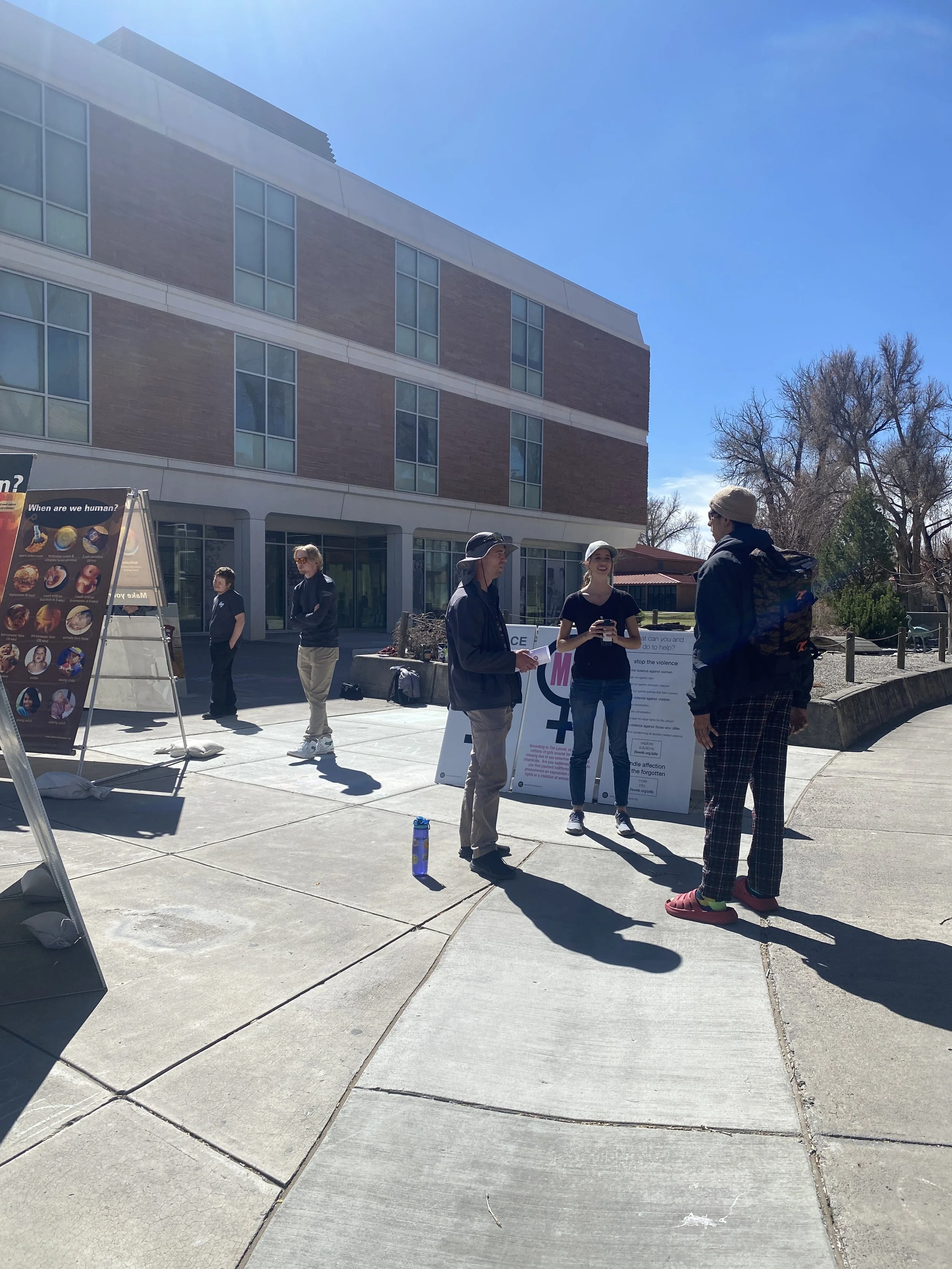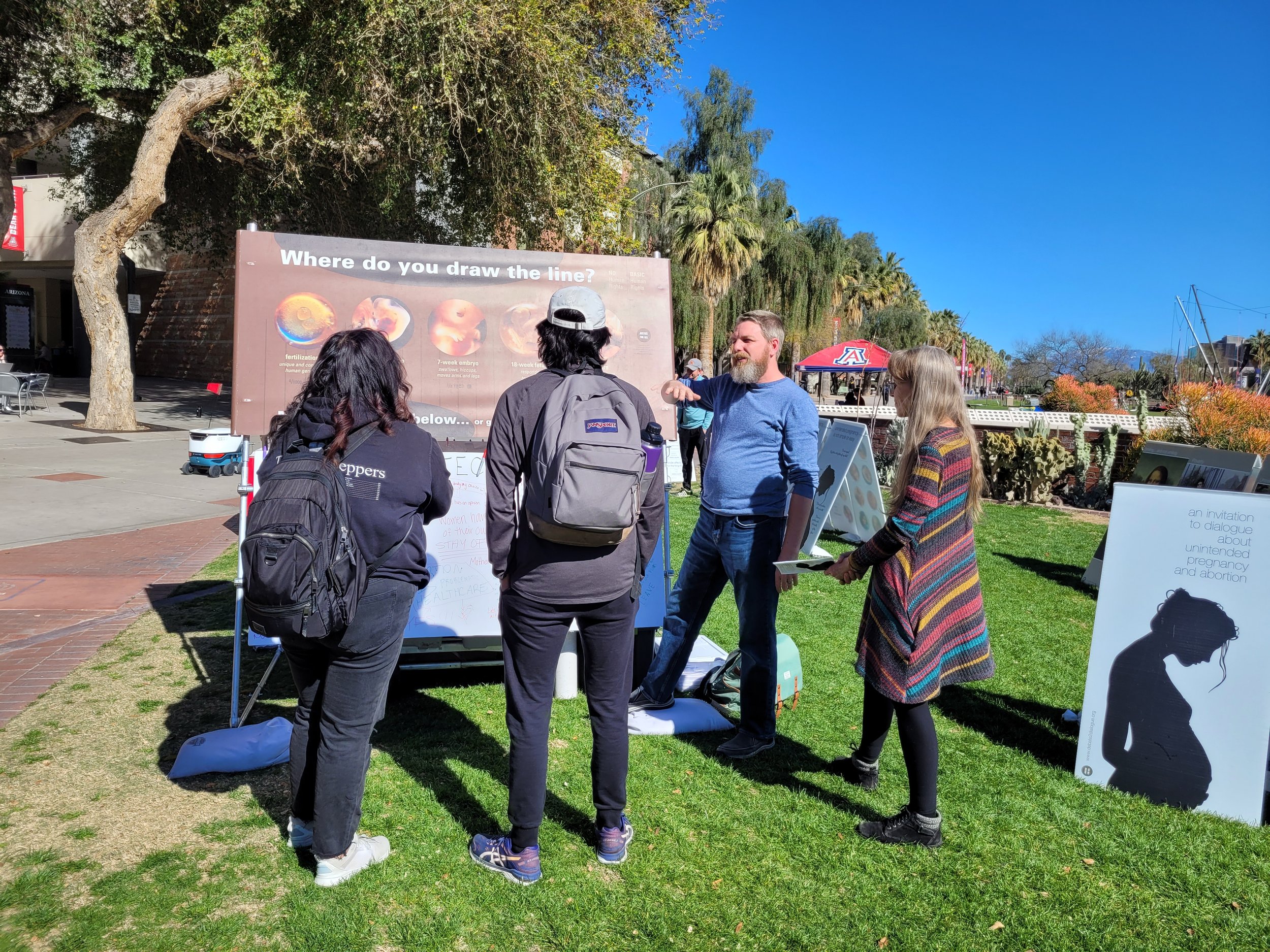Impact Report, May 2024
In this Impact Report, we feature a reflection from JFA trainer Andrea Thenhaus along with pictures of JFA trainers and volunteers at recent outreach events. In early April, Andrea had a memorable conversation with Henry at Grand Valley State University near Grand Rapids, Michigan. Although many people with whom we interact on campus don’t reveal their inner thought processes, Henry was kind enough to give Andrea a glimpse of how the conversation was changing him. Aha moments are a joy to witness, but whatever the results seem on the surface, we thank God for helping us speak for those who cannot speak for themselves (Proverbs 31:8). We thank God for you and for your partnership as we seek to be faithful in each conversation.
-Steve Wagner, Executive Director
Andrea (center) and volunteer Kalen (left) at Adams State University in Colorado (April)
Our team was nearing the end of our second day of outreach at Grand Valley State University. While the team started taking everything down, I remained available for conversations.
About this time, a student I’ll call “Henry” walked by our exhibit. I asked him if he had time to share his thoughts on the issue of abortion.
Henry replied that he was on his way to class and could not talk. Then a minute later, he turned around and said, “Actually, I have a few minutes to talk.” Our conversation went something like this:
Andrea: Okay, awesome. Do you think abortion should be legal or illegal?
Henry: I think it should be legal mainly for cases like rape, health of the baby, and life of the mother.
Andrea: Those are all hard cases for sure. Rape is such a horrific thing. Even if the woman does not get pregnant, it is still a traumatic experience. Then if the woman gets pregnant, things get even more complicated.
Kaitlyn (sitting), Kristina (center), and Seth (right) at University of Cincinnati (March)
Rather than jumping right into challenging Henry on his viewpoint, I was taking the time to slow down and show compassion for people who have been raped. Pro-choice and pro-life people all agree that rape is horrific, and it is helpful to find that common ground in our conversations. After spending a few minutes meeting the relational challenge inherent in discussing the topic of rape by acknowledging how difficult that situation is, I went on to intellectually respond to the questions he raised.
Andrea: For these specific circumstances that you mentioned, do you think abortions should be legal for all nine months of pregnancy or for a certain period of time?
Henry: Definitely a certain period of time. I believe the unborn are living human beings, so abortion should be legal for only the first trimester.
Andrea: Okay. Do you know anyone who has been affected by rape?
Henry: No, I do not. I just know it happens.
Andrea: Yeah, for sure. Here’s one way I look at it. Imagine there are two women who have been violated through rape. Both women have gotten pregnant. One of the women has given birth to her son. He is two months old now. The other woman is two months pregnant. If I asked you if both women have the right to kill their child, I think you would say no.
Henry: Right! Of course the woman with the two-month-old should not be able to kill her child.
Steve and volunteer Kim (right) at University of Arizona (February)
Andrea: I totally agree. If the unborn are human beings like the two-month-old, then we should protect the unborn even if they came about through rape, right?
Henry: You made a good point there! That makes sense. And why should the unborn be punished for the wrong that was committed?
Andrea: I agree.
Henry: Abortion should only be legal for the health of the baby and the life of the mother.
I addressed these issues, and by the end of the discussion, Henry responded:
Henry: Wow! Those are good points. This has given me a lot to think about.
Before Henry left for class, he thanked me for the conversation. I could tell that God was working in his life. Henry realized that since the unborn are living human beings, they should be protected even if they may not live very long or if they were conceived through rape.
Our trainers and volunteers often have opportunities to gently challenge pro-choice students and point out the inconsistencies in their views by asking them questions that help them think through the issue themselves. Thank you for your prayers and support that allow us to have conversations with students like Henry.




